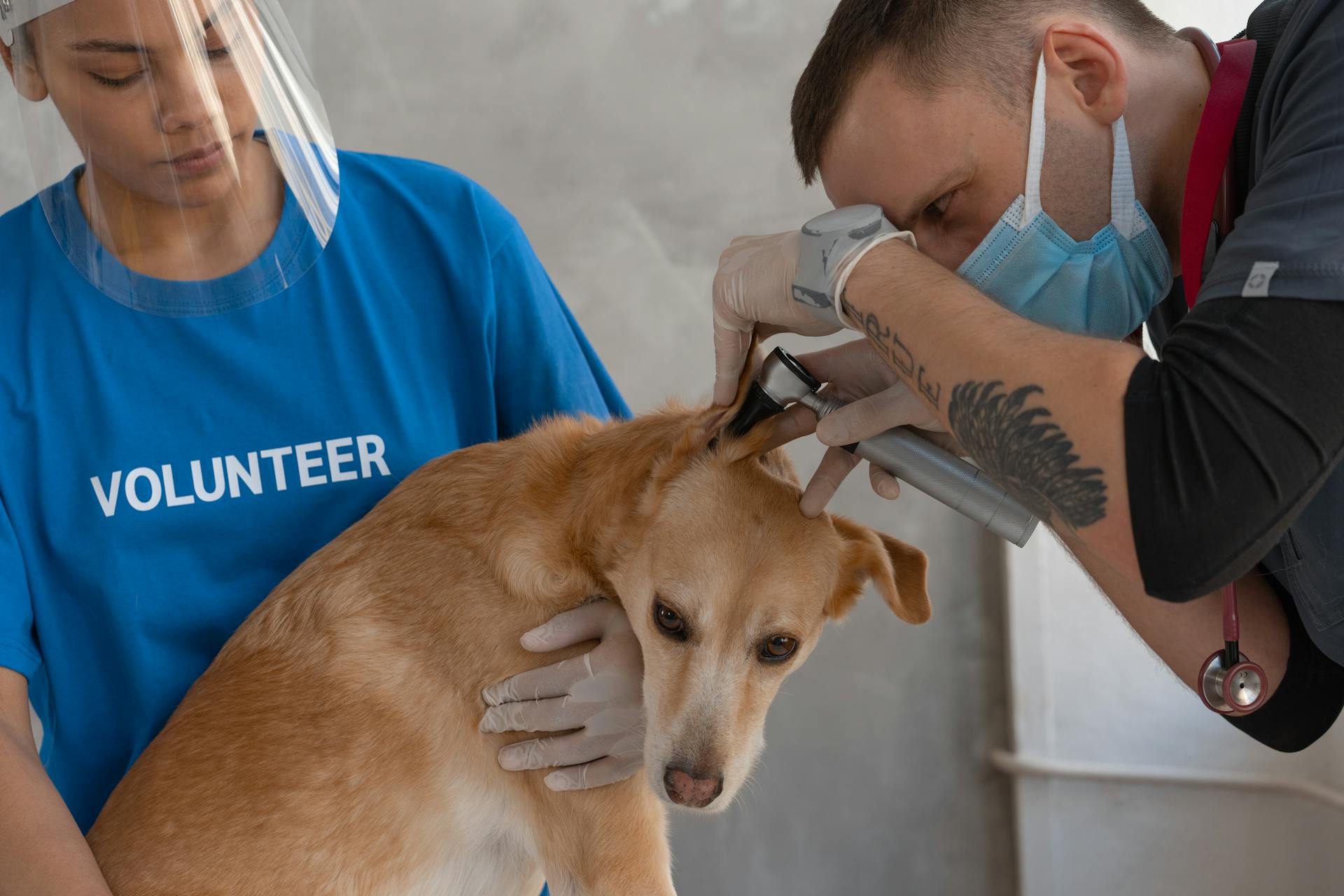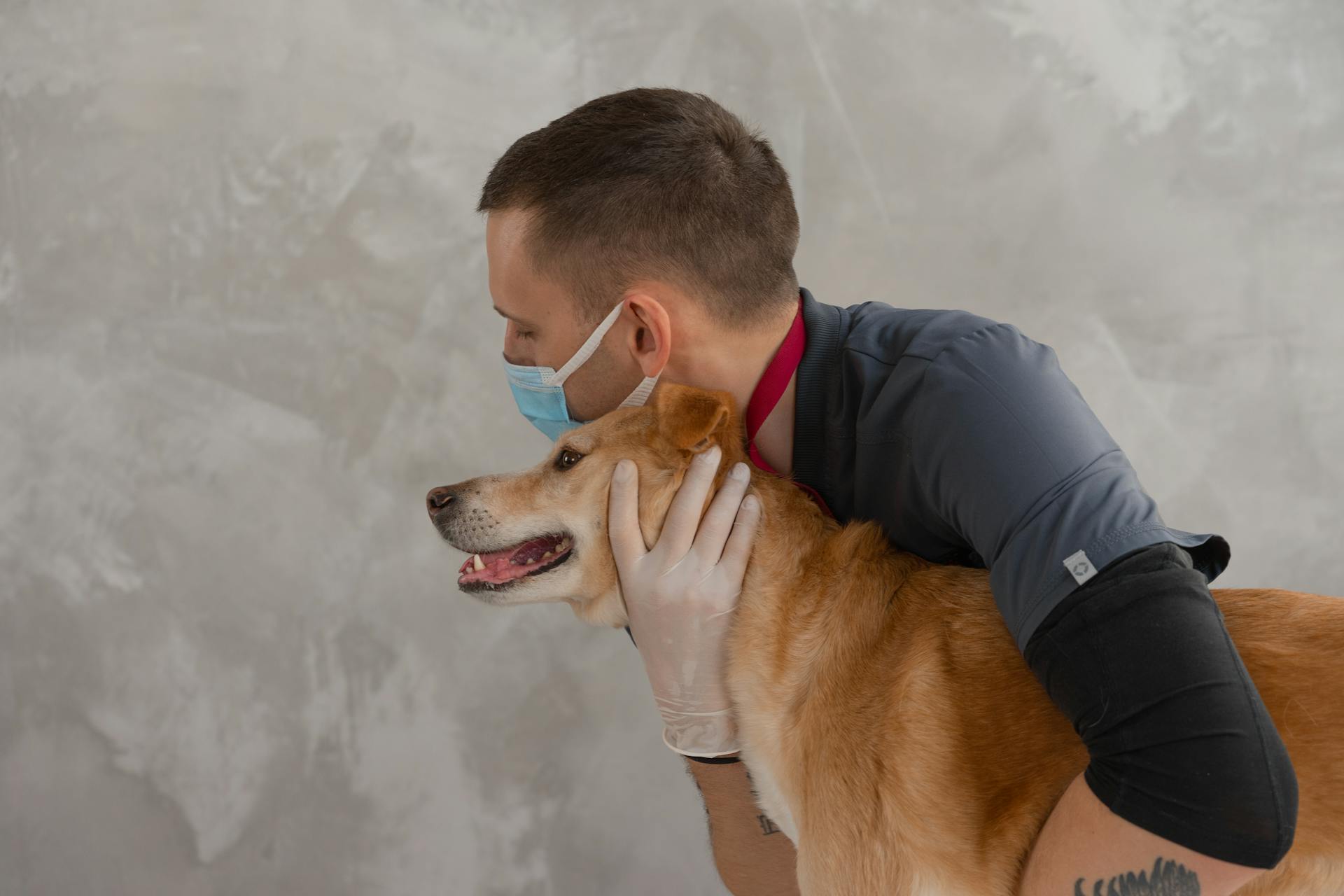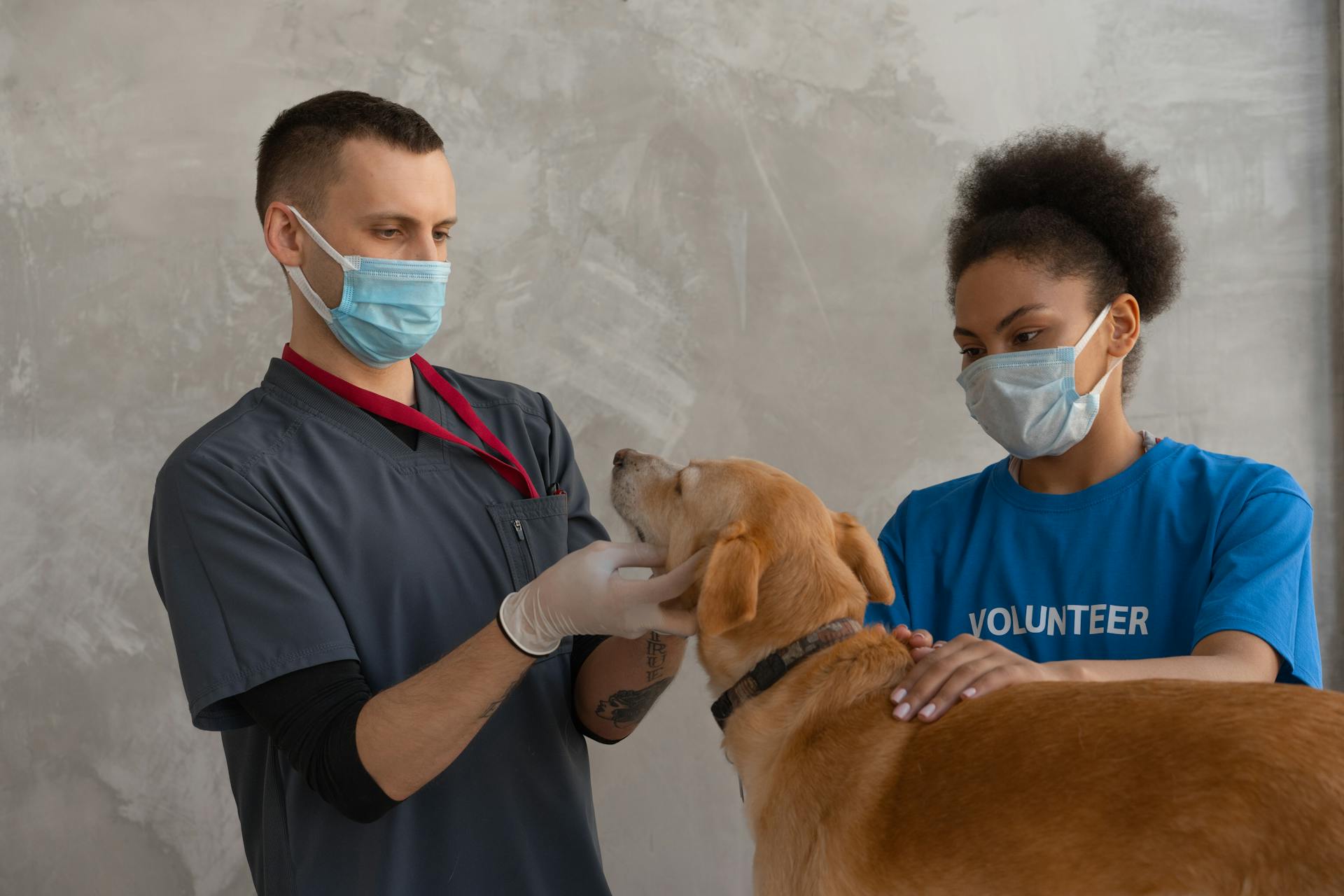
If you're considering giving probiotics to your furry friend, you're not alone. Many dog owners are turning to probiotics as a way to support their dog's digestive health.
Probiotics can be beneficial for dogs, especially those with gastrointestinal issues. Research has shown that probiotics can help improve digestion, reduce inflammation, and even alleviate symptoms of irritable bowel disease in dogs.
Some dog probiotics contain strains that are specifically designed to target the unique gut microbiome of dogs. For example, the Lactobacillus acidophilus strain is commonly used in dog probiotics.
Dogs with sensitive stomachs may benefit from probiotics, but it's essential to choose a product that's specifically formulated for dogs.
Additional reading: Dog Probiotics
What Are Dog Probiotics?
Dog probiotics are "good bacteria" or "beneficial bacteria" that help support the health and well-being of dogs.
Probiotics work by colonizing the intestinal tract and crowding out harmful bacteria, which aids digestion and absorption of nutrients.
The colony-forming units (CFU) count is a key factor in determining the effectiveness of probiotics, and it indicates the number of viable bacterial cells present in the supplement.
A recommended daily CFU count for dogs is between 1 and 10 billion, and the best dog probiotics for allergies have at least 5 million CFU.
Benefits
Dogs can benefit from probiotics in many ways. Probiotics can help with digestion, reducing symptoms like diarrhea, excess gas, and irregular bowel movements.
Probiotics can also boost a dog's immune system, helping to prevent illnesses and allergies. Some studies suggest a link between probiotics and a dog's natural defenses against illness and allergies.
Dysbiosis, an imbalance of bad bacteria over good bacteria in the gut, can lead to health problems. Probiotics can help restore balance and prevent or improve leaky gut, a condition where foreign bodies enter the bloodstream from the intestinal tract.
Probiotics can also soothe digestive issues caused by conditions like Inflammatory Bowel Disease (IBD), Pancreatitis, and kidney disease.
Here are some benefits of probiotics for dogs:
- Improved digestion and reduced symptoms like diarrhea and gas
- Boosted immune system and prevention of illnesses and allergies
- Restored balance of good and bad bacteria in the gut
- Soothe digestive issues caused by conditions like IBD, Pancreatitis, and kidney disease
- Improved nutrient absorption and overall health
Probiotics may also help with occasional diarrhea, vomiting, and gas, especially after dietary changes or antibiotic use. They can even support a dog's digestive health, helping to regulate other bacteria in their gut and combating yeast overgrowth.
How They Work
Dog probiotics work by maintaining a healthy balance of microorganisms within the digestive system. This balance is crucial for the overall digestive process.
Probiotics contribute to the intestinal tract's ability to break down food properly, which allows for the absorption of essential nutrients.
By promoting a strong immune system, probiotics also enable the body to fight off harmful bacteria.
Memory with Age
As dogs age, their memory can benefit from a balanced gut microbiome. A healthy gut has been linked to better memory in dogs, with studies showing that probiotics support intestinal and immune health.
Probiotics can help boost a dog's immune system, which positively influences brain function. In fact, a 2020 study found that the number of errors dogs make in a short-term memory test is linked to their gut microbiome composition.
Dogs with more "Fusobacteria" in their gut tend to have better memory performance. This is an interesting finding, as it suggests that a balanced gut microbiome is essential for a dog's cognitive health.
Healthy gut bacteria also reduces the number of "Actinobacteria", a bacteria found in the gastrointestinal tract of people with Alzheimer's disease. This is a significant connection, highlighting the importance of gut health for overall well-being.
How Work?

Probiotics for dogs work by maintaining a healthy balance of microorganisms within the digestive system. This balance is crucial for a dog's overall health.
Probiotic products help the intestinal tract break down food properly. They also enable the absorption of essential nutrients.
A strong immune system is promoted by probiotics, allowing it to fight off harmful bacteria. This is especially important for dogs with sensitive stomachs or digestive issues.
Choosing and Using
Choosing the right probiotic for your dog can feel overwhelming, but it's worth taking the time to get it right. Consider adding digestive enzymes to your dog's probiotic for better nutrient absorption and digestion.
You can choose from a range of probiotics, including those with prebiotics to support probiotic bacteria and promote a thriving gut flora. This can lead to better regulated digestion and an optimal immune system.
Probiotics containing fiber, such as pumpkin or sweet potatoes, can provide gentle digestive support and help regulate gut bacteria. This can be especially helpful for dogs with constipation, diarrhea, or digestive discomfort.
It's essential to consult with your veterinarian to determine your dog's specific needs and choose a probiotic that's tailored to their requirements. They can help you identify areas where your dog needs extra support.
Daily probiotic supplementation is safe for dogs, provided you follow the recommended guidelines and dosages. A daily dose of 20 billion CFU of probiotics can improve gut health in healthy dogs.
Choosing the Right Supplement
Choosing the right supplement for your dog can be a daunting task, especially with so many options available. It's essential to consider your dog's individual needs and health status before making a decision.
First, consult with your veterinarian to determine the best course of action for your dog's specific health concerns. They can recommend a probiotic supplement that meets your dog's needs and provide guidance on dosage and administration.
When selecting a probiotic supplement, look for products with added digestive enzymes, prebiotics, and multiple strains of beneficial bacteria. These features can help promote better digestion, regulate bowel movements, and support a healthy gut microbiome.
Consider the following factors when choosing a probiotic supplement:
- CFU (Colony-Forming Units) count: A higher CFU count doesn't always mean a better product, but it can indicate a more potent supplement.
- Strains of beneficial bacteria: Look for products with multiple strains, such as Lactobacillus acidophilus, Bifidobacterium longum, and Bacillus coagulans.
- Prebiotics: Prebiotics help feed the good bacteria in your dog's gut, promoting a healthy balance of gut flora.
- Ingredients: Avoid products with artificial flavors, fillers, and other undesirable ingredients.
Some popular probiotic supplements for dogs include:
- Visbiome: Offers an extremely high CFU count (225 billion per packet) and multiple strains of beneficial bacteria.
- PetLab Co.: Provides a blend of probiotics, prebiotics, and other beneficial ingredients.
- Pet Honesty: Offers a range of probiotic supplements with added digestive enzymes and prebiotics.
Remember to always follow the recommended dosage and administration instructions, and consult with your veterinarian if you have any questions or concerns.
Chews
Probiotic dog chews can be a great way to support your furry friend's digestive health. Some owners swear by them, like the Yorkie owner who used probiotic chews to help her dog recover from pancreatitis.
The key is to find a product that works for your dog. The article mentions three products: Probiotic Dog Chews, Pawfy, and Purina Fortiflora. Each has its own strengths and weaknesses.
Pawfy, for example, offers a good balance of CFUs and bacterial strains, with 2.5 billion CFUs per chew and multiple strains. This can provide a significant boost to your dog's digestive and immune systems.
However, some owners may find Pawfy too costly, especially if their dog is extra large like the pup in the review. On the other hand, Purina Fortiflora is more affordable, but its lower CFU count may make it less potent.
Here's an interesting read: Do Dog Calming Chews Work
It's worth noting that some probiotic chews may have undesirable ingredients, such as corn, soy, or fish, which can be problematic for dogs with allergies. For example, Purina Fortiflora contains several allergens.
Here's a quick rundown of the products mentioned:
Ultimately, the best probiotic chew for your dog will depend on their individual needs and health status. Be sure to read reviews and consult with your veterinarian to find the right product for your furry friend.
Potential Issues and Side Effects
Supplements specifically designed for dogs are the safest way to add probiotics to your dog's diet. If you follow the dosage instructions, you're unlikely to run into any problems.
However, it is possible for a dog to experience side effects from probiotics, particularly when supplementation first starts or if they are put on a very high dose. These side effects may include excess gas, loose stool, constipation, abdominal discomfort, and poor appetite.
These symptoms will usually resolve after a few days. If they are severe, stop giving your dog the probiotic supplement and talk to your veterinarian.
Stomach Issues Due to Conditions
If your dog is experiencing digestive issues due to a medical condition, there's hope for relief. Probiotic products can help soothe stomach issues caused by Inflammatory Bowel Disease (IBD), Pancreatitis, and kidney disease.
These conditions can cause ongoing digestive problems, making it essential to work with your veterinarian to find the right treatment. Your vet may suggest using probiotic products to help alleviate symptoms.
Probiotics promote a healthy gut flora, which is especially important for dogs with sensitive stomachs. They can provide relief for dogs with food sensitivities and intolerances.
Side Effects
Side effects from probiotics can occur, but they're usually temporary and resolve on their own after a few days. If your dog experiences any of these symptoms, it's essential to consult with your veterinarian.
Excess gas is one of the most common side effects of probiotics in dogs. This can lead to discomfort and embarrassment for both you and your furry friend.

Loose stool, constipation, abdominal discomfort, and poor appetite are also possible side effects. These symptoms can be caused by the probiotics adjusting to your dog's system.
Here are some common side effects of probiotics in dogs:
- Excess gas
- Loose stool
- Constipation
- Abdominal discomfort
- Poor appetite
If your dog's side effects are severe, it's crucial to stop the probiotic supplement and consult with your veterinarian. They may recommend reducing the dose or trying a different product.
Supplements and Forms
Dog probiotics come in many forms, and the best option for your furry friend will depend on their individual needs and preferences. Some popular forms include powders, capsules, and probiotic chews that taste like treats.
Powders are a popular option because they can include large numbers of microorganisms and can be sprinkled on or mixed in regular dog food. However, if your dog tends to be turned off by changes to their diet, another option might be better for them.
Capsules or pills are a good choice for picky eaters or dogs who can't tolerate a change to their diet. You can hide them in yummy treats or use a pill popper to make it easier to get your dog to take their probiotic.
Probiotic chews are another option, but some contain low numbers of probiotics, and giving your dog too many can lead to weight gain or dietary imbalances.
Here are some common forms of canine probiotics:
- Commercial dog food with probiotics
- Probiotic treats
- Dog probiotic powders
- Capsules or tablets
- Liquids
- Pastes
Forms

Powders are a popular option because they can include large numbers of microorganisms and can be sprinkled on or mixed in regular dog food. Some powdered probiotics are flavored to make them even more attractive.
If your dog tends to be turned off by changes to their diet, another option might be better for them. Picky eaters or dogs who can’t tolerate a change to their diet tend to do well with capsules or pills.
Some commercially available dog foods are supplemented with probiotics. However, it's essential to make a dietary change slowly to avoid disrupting your dog's digestive health.
Probiotic-rich food may be a good option if you were already looking to change your dog's food. But, make sure the diet you choose provides complete and balanced nutrition for your dog's life stage.
Here are some common forms of probiotics for dogs:
- Powders
- Capsules or pills
- Probiotic chews
- Commercial dog foods
Supplements
Probiotic supplements come in various forms, including powders, capsules, pills, chews, and even yogurt. However, not all probiotics are created equal, and the right form for your dog depends on their individual needs and preferences.

If your dog is a picky eater or has trouble with changes to their diet, capsules or pills might be a better option. Some probiotics come in tasty chews that dogs love, but be careful not to overdo it, as too many can lead to weight gain or dietary imbalances.
Commercial dog foods are also being supplemented with probiotics, but make sure to transition your dog slowly to avoid digestive issues. If you're already planning to switch your dog's food, consider a probiotic-rich option that provides complete and balanced nutrition.
Some probiotics, like yogurt, might seem like a convenient option, but be cautious as some dogs are lactose-intolerant. If you do decide to give your dog yogurt, choose a plain and unsweetened variety with live cultures.
Here are some common forms of probiotic supplements for dogs:
- Powders: can be sprinkled on or mixed in regular dog food
- Capsules or pills: ideal for picky eaters or those with dietary issues
- Chews: tasty treats that dogs love, but be mindful of overconsumption
- Commercial dog foods: supplemented with probiotics, but transition slowly
- Yogurt: plain and unsweetened varieties with live cultures, but be cautious of lactose intolerance
Itchy Skin and Allergies
Itchy skin and allergies can be a real challenge for many dog owners. Probiotics have been shown to help alleviate skin itchiness in dogs, particularly those with allergies or immune-related skin conditions.
Probiotics work by supporting gut health and modulating the immune system, which helps reduce inflammation and alleviate itching. In fact, a study by Kim et al. found that the probiotic strain Lactobacillus sakei probio-65 significantly reduced the disease severity index in dogs diagnosed with canine atopic dermatitis.
Some common causes of itchiness in dogs include food or shampoo allergies, environmental allergies, flea bites, and bacterial skin infections. Administering probiotics for allergies can help minimize skin sensations that cause dogs to itch.
A healthy balance of gut bacteria is essential for overall skin health, and probiotics can help promote this balance. In fact, a study by Roudsari et al. found that probiotics show potential in preventing and treating skin diseases like eczema, atopic dermatitis, acne, and allergic inflammation.
Here are some common causes of itchiness in dogs:
- Food or shampoo allergies
- Environmental allergies
- Flea bites
- Bacterial skin infections
Reducing Seasonal Allergy Symptoms
If your dog suffers from seasonal allergies, probiotics may help regulate their immune system to reduce allergy symptoms.
Probiotics can alleviate itching, redness, and discomfort associated with seasonal allergies by supporting your dog's immune system.
A study found that probiotic enema with Lactobacillus plantarum and Lactobacillus paracasei significantly reduces itching in dogs with atopic dermatitis.
Probiotics foster a healthy microbiome, which boosts the immune system's ability to ward off inflammatory responses.
By promoting a healthy gut and immune system, probiotics can help dogs overcome skin itchiness caused by seasonal allergies.
Probiotics may help reduce the severity of allergy symptoms, making them a valuable addition to your dog's allergy treatment plan.
Here are some ways probiotics can help alleviate seasonal allergy symptoms in dogs:
- Regulate the immune system to reduce allergic reactions
- Alleviate itching, redness, and discomfort associated with seasonal allergies
- Support gut health and modulate the immune system
Remember to consult with your veterinarian before starting any new supplement regimen, including probiotics, to ensure they are suitable for your dog's specific needs.
Bites
Probiotic bites can be a great way to help your dog's digestive health.
They come in a variety of flavors and can be easily dispensed, even to cooperative dogs.
The recommended dose is usually 2 bites per serving.
Some probiotic bites contain a six-strain gut health blend, including Bacillus subtilis DE111 and Lactobacillus acidophilus.
These strains can help regulate your dog's gut health and reduce stress.
Probiotic bites can be especially helpful during times of stress or change, such as moving to a new home.
Some dogs even love the taste of probiotic bites, making them a treat they look forward to.
A well-rounded probiotic with 3 billion CFUs per chew is a great option, but be aware of the potential presence of tree nuts.
This can be a downside for dogs with allergies.
Best and Reviews
If you're considering trying dog probiotics, you're not alone - many pet owners swear by their effectiveness.
The top-ranked probiotics offer high potency, a comprehensive range of beneficial bacteria, and favorable customer policies, ensuring your pet receives the best possible care.
According to the criteria used to select the top probiotics for dogs, a more potent product is indicated by higher CFUs (Colony Forming Units).
Prebiotics can enhance the effectiveness of probiotics, making them a valuable addition to any probiotic product.
One reviewer's experience with Tails n Tummies probiotics is particularly noteworthy.
They saw a significant improvement in their dog's skin condition, and they're not alone - many pet owners have reported similar success with probiotics.
Here are some of the top-rated probiotics for dogs, ranked from best to good:
A better refund policy can indicate product confidence, and many of the top-rated probiotics offer a money-back guarantee.
The variety of conditions it helps with is also an important factor in selecting a probiotic product.
Sources
- https://bettervet.com/resources/pet-nutrition/probiotics-for-dogs
- https://manypets.com/us/blog/probiotics-for-dogs/
- https://doggysdigest.com/probiotics-for-dogs/
- https://www.akc.org/expert-advice/health/choosing-probiotics-for-your-dog/
- https://www.honestpaws.com/blogs/probiotics/probiotics-for-dogs-with-itchy-skin
Featured Images: pexels.com


